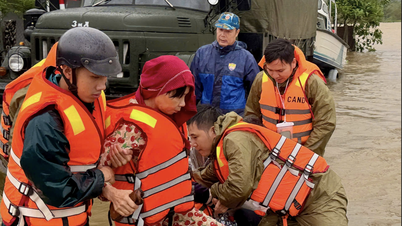(Dan Tri) - The issue of climate change is often associated with the 1.5 degree Celsius temperature increase limit. What does that mean?

The past decade has been the world 's hottest on record. (Photo: Chris Lewis).
Scientists have confirmed that 2024 was the hottest year since we started tracking global temperatures and the first year that Earth's temperature rose more than 1.5 degrees Celsius compared to pre-industrial times.
1.5 degrees is a "formidable" number because it is the target that world leaders agreed to set as a limit on global warming through the Paris Agreement signed in 2015.
However, while the above temperature record is nothing to celebrate, exceeding 1.5 degrees Celsius does not mean we have violated the Paris Agreement.
What is the Paris Agreement?
The Paris Agreement is an international treaty on climate change.
It was the first time that nearly all the world's countries agreed to work together to limit global warming and adapt to climate change. 196 countries signed the agreement.

Australian students rally to demand government action on climate change. (Photo: Mark Metcalfe/ Getty Images).
Countries agreed to significantly reduce greenhouse gas emissions to keep the long-term average global surface temperature "well below 2 degrees Celsius" above pre-industrial levels.
Countries also agreed to "endeavor" to limit temperature increase to no more than 1.5 degrees Celsius compared to pre-industrial times, using the period from 1850 to 1900 as the baseline.
What does 1.5°C warming mean?
A temperature increase of 1.5 or 2 degrees Celsius on the surface can be very small. You will hardly feel the difference between a 27 degree day and a 29 degree day.
But Professor David Karoly, a climate scientist at the University of Melbourne, Australia, says a 1.5-degree global increase would mean more extremely hot days.
The 1.5°C target was set because the Intergovernmental Panel on Climate Change (IPCC) found that exceeding that threshold risks causing much more severe impacts of climate change, including droughts, heat waves, coastal flooding from more frequent and intense storms.
Professor Karoly also added that no level of global warming is absolutely safe. We have seen the effects of climate change in the last 10 to 20 years.
Heat waves are increasing, human health is affected, extreme rainfall or drought in some areas is also increasing significantly, and forest fires are occurring more frequently.
According to the World Meteorological Organization, the number of weather-related natural disasters has increased fivefold since 1970.
Source: https://dantri.com.vn/khoa-hoc-cong-nghe/nhet-do-toan-cau-nam-2024-vuot-15-do-c-co-pha-vo-thoa-thuan-paris-20250201061922982.htm





![[Photo] The Standing Committee of the Organizing Subcommittee serving the 14th National Party Congress meets on information and propaganda work for the Congress.](https://vphoto.vietnam.vn/thumb/1200x675/vietnam/resource/IMAGE/2025/11/19/1763531906775_tieu-ban-phuc-vu-dh-19-11-9302-614-jpg.webp)
































![[Photo] General Secretary To Lam receives Slovakian Deputy Prime Minister and Minister of Defense Robert Kalinak](https://vphoto.vietnam.vn/thumb/1200x675/vietnam/resource/IMAGE/2025/11/18/1763467091441_a1-bnd-8261-6981-jpg.webp)
![[Photo] Prime Minister Pham Minh Chinh and his wife meet the Vietnamese community in Algeria](https://vphoto.vietnam.vn/thumb/1200x675/vietnam/resource/IMAGE/2025/11/19/1763510299099_1763510015166-jpg.webp)










































































Comment (0)